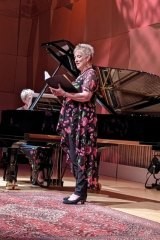 At an age when most singers have well and truly retired, Merlyn Quaife lived up to her aim of being a “fearless soprano” by celebrating a significant birthday with a demanding but astutely constructed program of art song reflecting her career-long advocacy of Australian music. Her fearlessness was demonstrated from the outset in Johanna Selleck’s The Prospect and Bower of Bliss, settings of texts by the Restoration poet and proto-feminist Aphra Behn, where she unwaveringly traversed the highly strung, sinuously chromatic vocal lines, while not losing sight of the score’s celebration of “sweet and ravishing” things.
At an age when most singers have well and truly retired, Merlyn Quaife lived up to her aim of being a “fearless soprano” by celebrating a significant birthday with a demanding but astutely constructed program of art song reflecting her career-long advocacy of Australian music. Her fearlessness was demonstrated from the outset in Johanna Selleck’s The Prospect and Bower of Bliss, settings of texts by the Restoration poet and proto-feminist Aphra Behn, where she unwaveringly traversed the highly strung, sinuously chromatic vocal lines, while not losing sight of the score’s celebration of “sweet and ravishing” things.
A deep engagement with the poems of Judith Wright was evident in the passionate and assured delivery of Here Where Death and Life are Met by Richard Mills; Merlyn expertly and empathetically revealing Mills’ richly textured lyrical and harmonic outpourings. Here, as elsewhere in the program, her longstanding accompanist Andrea Katz provided insightful support through her colourful but finely calibrated pianism.
Suffused with the heady sensibility of late German romanticism, Melbourne composer Luke Severn’s sumptuous Wandrers Nachtlied I and Wandrers Nachtlied II received highly atmospheric premieres.
Severn’s effective harnessing of Goethe’s images of nocturnal peace to provide an oasis of calm proved the perfect foil to the hugely enjoyable finale which came in the form of Keith Humble’s Eight Cabaret Songs. Merlyn revelled in this opportunity to show off her lighter side. Whether as a streetwise cockney in Girl’s Song, a tipsy socialite in Drinking Song, or a lovelorn suitor in O tell me the truth about love, her considerable ability as a singer-actor and a seller of songs was never in doubt.
This fearless exploration of challenging repertoire together with her rare blend of high intelligence, polished technique and unaffected humanity would suggest that Merlyn Quaife still has many intrepid musical adventures in store.

